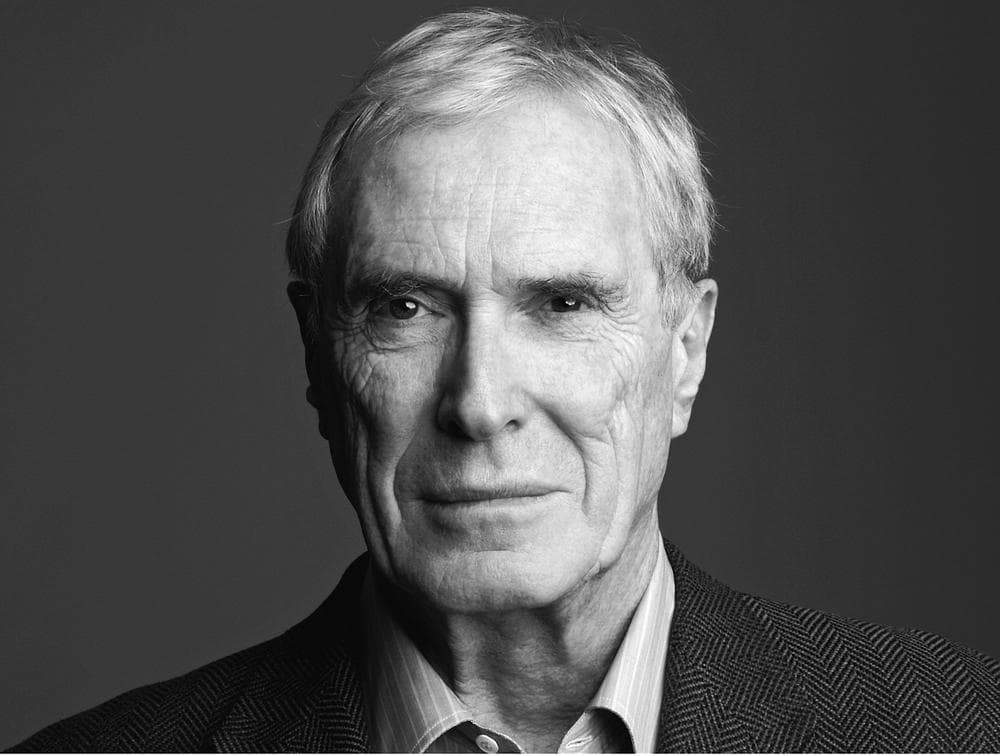Advertisement
Poet Mark Strand Touches On Loss, Also Humor
Resume
By: Alex Ashlock
A long time ago, in another lifetime, at another radio station, I had to fill in as the host of our daily talk show, when the regular host called in sick.
Best thing that ever happened to me.
The guest was the Pulitzer Prize-winning poet, Mark Strand. I knew his name but not his poetry, but by chance I had just read a magazine piece he had written about the classic American painter, Edward Hopper.
Now, I've been reading Mark Strand's latest book of poems. It's called "Almost Invisible," and when read in the context of Strand's appreciation of Hopper, the poems have deeper resonance.
In a short book about Hopper, Strand described the people in Hopper's paintings like "Nighthawks" as "characters whose parts have deserted them and now, trapped in the space of their waiting, must keep themselves company with no clear place to go, no future."
You might say the same thing about the characters in the poetry Mark Strand is writing today. Here he reads a poem called "In The Afterlife."
At 77, this seems like the poet in winter. As Strand told Here & Now's Robin Young:
"This is the story of my career. A young poet who was thrilled with what he wrote and the sparks came thick and fast. Later on they don't come with the same force... I'm not painting a tragic picture here, it's just the way things are... I mean as you get older, you tend to spend more time looking back and less time looking ahead, because there's not much time ahead of you."
Still, I shouldn't make it sound like these new poems are all doom and gloom. There's also lot of humor. For example, in "Almost Invisible."
Mark Strand is now writing a memoir about his parents. It sounds like a fascinating story, as Strand told it to us:
"Everything I grew up knowing about my father was false. He spent most of his life concealing the fact that he spent time in San Quentin Penitentiary for grand theft before he met my mother. My mother never knew. I grew up hearing amazing stories of his exploits, wonderfully outrageous inventions. He said his mother died giving birth to him, which she didn't. I think my father's ability to fantasize and create a fiction of his life may have been the seeds of what I became."
Book Excerpt: 'Almost Invisible'
By: Mark Strand
A Banker in the Brothel of Blind Women
A banker strutted into the brothel of blind women. “I am a shepherd,” he announced, “and blow my shepherd’s pipe as often as I can, but I have lost my flock and feel that I am at a critical point in my life.” “I can tell by the way you walk,” said one of the women, “that you are a banker only pretending to be a shepherd and that you want us to pity you, which we do because you have stooped so low as to try to make fools of us.” “My dear,” said the banker to the same woman, “I can tell that you are a rich widow looking for a little excitement and are not blind at all.” “This observation suggests,” said the woman, “that you may be a shepherd after all, for what kind of rich widow would find excitement being a whore only to end up with a banker?” “Exactly,” said the banker.
The Everyday Enchantment of Music
A rough sound was polished until it became a smoother sound, which was polished until it became music. Then the music was polished until it became the memory of a night in Venice when tears of the sea fell from the Bridge of Sighs, which in turn was polished until it ceased to be and in its place stood the empty home of a heart in trouble. Then suddenly there was sun and the music came back and traffic was moving and off in the distance, at the edge of the city, a long line of clouds appeared, and there was thunder, which, however menacing, would become music, and the memory of what happened after Venice would begin, and what happened after the home of the troubled heart broke in two would also begin.
Poem of the Spanish Poet
In a hotel room somewhere in Iowa an American poet, tired of his poems, tired of being an American poet, leans back in his chair and imagines he is a Spanish poet, an old Spanish poet, nearing the end of his life, who walks to the Guadalquivir and watches the ships, gray and ghostly in the twilight, slip downstream. The little waves, approaching the grassy bank where he sits, whisper something he can’t quite hear as they curl and fall. Now what does the Spanish poet do? He reaches into his pocket, pulls out a notebook, and writes:
Black fly, black fly
Why have you come
Is it my shirt
My new white shirt
With buttons of bone
Is it my suit
My dark-blue suit
Is it because
I lie here alone
Under a willow
Cold as stone
Black fly, black fly
How good you are
To come to me now
How good you are
To visit me here
Black fly, black fly
To wish me goodbye
Excerpted from ALMOST INVISIBLE by Mark Strand. Copyright © 2012 by Mark Strand. Excerpted by permission of Knopf, a division of Random House, Inc. All rights reserved. No part of this excerpt may be reproduced or reprinted without permission in writing from the publisher.
This segment aired on March 13, 2012.